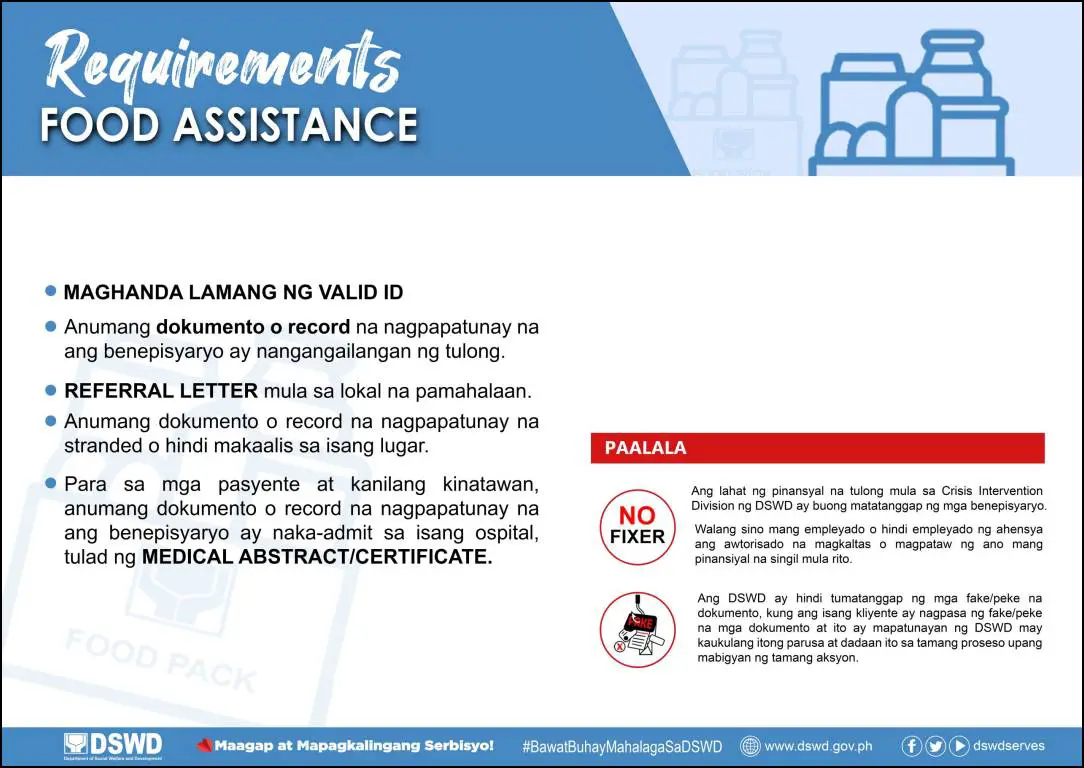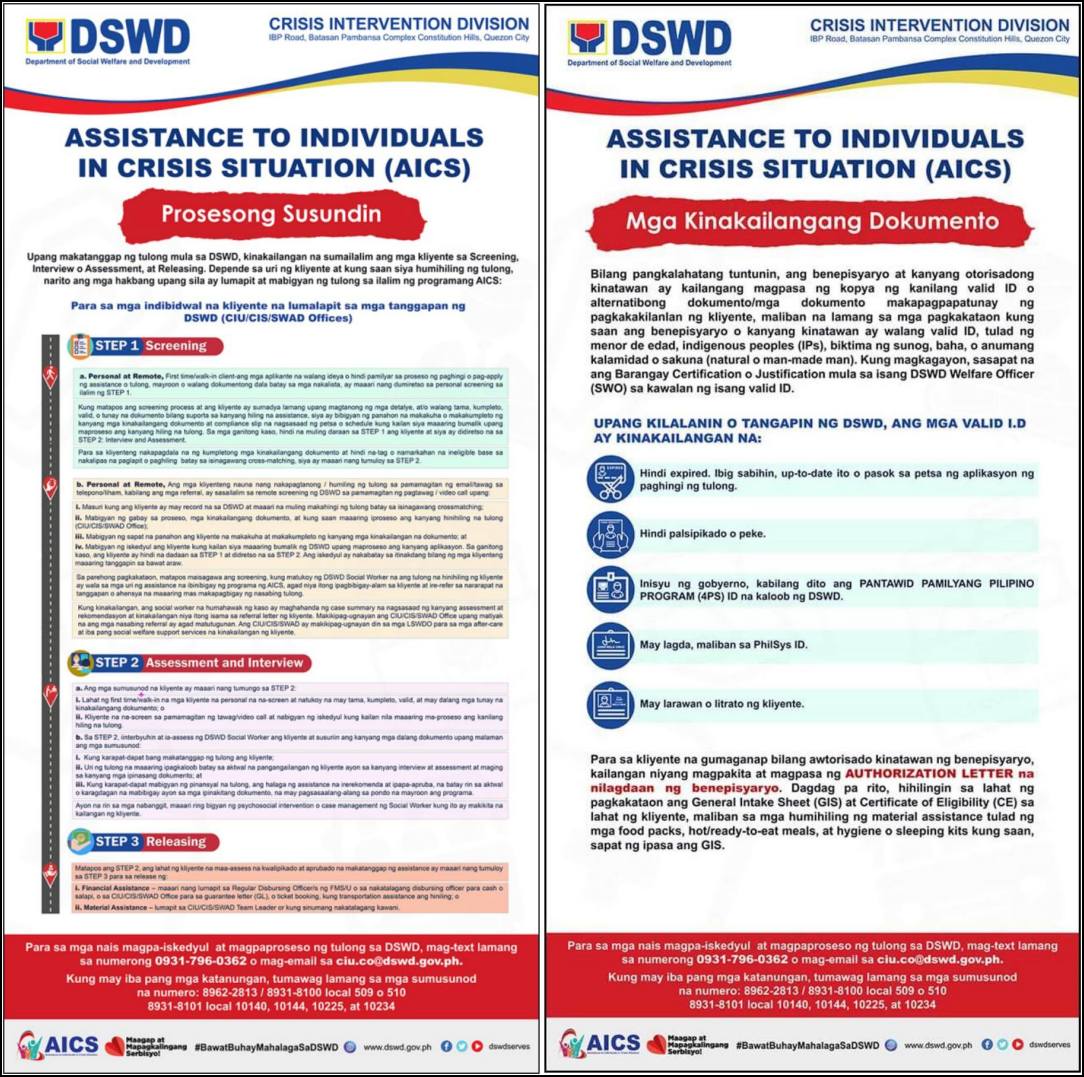The Department of Social Welfare and Development (DSWD) operates across the Philippines, including in the vibrant region of Cebu, to offer aid to individuals and families in crisis. One of their key initiatives is the Food Assistance program under the broader Assistance to Individuals in Crisis Situations (AICS) program.
Also read: How to Apply DSWD Cash Aid Assistance for Senior Citizens
In Cebu, as in other regions, the Food Assistance program plays a pivotal role in supporting those facing food insecurity due to unforeseen emergencies. Whether it’s due to natural calamities, sudden economic hardships, or any other crisis situations, DSWD extends its help to ensure no one goes hungry.

What is DSWD Food Assistance?
The Food Assistance program provides support in the form of food packs or hot meals, aiming to provide immediate, nutritious sustenance to those in need. This initiative is a part of DSWD’s larger commitment to enhancing the welfare of Filipino citizens, particularly those who are poor, vulnerable, and disadvantaged, by offering timely and responsive aid.
Benefits of DSWD Food Assistance to Every Individual in Need
The DSWD Food Assistance program, part of the broader Assistance to Individuals in Crisis Situations (AICS) program, offers several benefits to those in need:
- Immediate Relief: The program provides instant aid to individuals and families facing food insecurity due to crisis situations, ensuring that they have access to food without delay.
- Nutrition Support: The food packs or hot meals provided through this program are nutritionally balanced to help maintain the health and wellbeing of the beneficiaries during their time of need.
- Broad Accessibility: The program is designed to reach out to all who are in need, including the poor, vulnerable, and disadvantaged, making it widely accessible.
- Flexibility: The assistance is not limited to people affected by natural disasters but also extends to those facing sudden economic hardships or other unforeseen emergencies.
- Enhanced Welfare: By providing timely food assistance, the program plays a vital role in enhancing the welfare of Filipino citizens, contributing to the broader social security network within the country.
- Ease of Application: The application process for the food assistance program is designed to be straightforward and user-friendly, allowing beneficiaries to access help quickly and efficiently.
- Community Support: Apart from individual benefits, the food assistance program also supports communities in times of crisis, fostering resilience and aiding in recovery.
- Poverty Alleviation: By providing essential sustenance in times of crisis, the program helps mitigate the impacts of poverty and supports beneficiaries in getting back on their feet.
NOTE: It is important to note that beneficiaries of financial aid from the Crisis Intervention Division of DSWD will receive the full amount, and no employee or non-employee of the agency has the authority to deduct or charge any financial fees.
Who is Qualified for the Food Assistance Program
The Food Assistance program under the Assistance to Individuals in Crisis Situations (AICS) by the Department of Social Welfare and Development (DSWD) is designed to aid individuals and families in crisis situations.
The following are generally considered eligible for the program:
1. Individuals or families in crisis situations
- These include those who have experienced sudden economic hardship, natural disasters, or other emergencies that have put them in a state of crisis.
2. Poor, vulnerable, and disadvantaged individuals or families
- The program primarily targets individuals or families who are economically disadvantaged and in dire need of assistance.
3. Stranded individuals or groups
- During emergencies or unforeseen events, individuals or groups stranded without access to food due to lack of resources can avail of this assistance.
4. Victims of disasters or calamities
- Those affected by natural or man-made disasters, such as typhoons, earthquakes, fires, or conflicts, who are unable to meet their food needs are eligible for this program.
5. Individuals or families with members who are sick or injured
- If an illness or injury leads to a crisis situation where the family or individual is unable to secure food, they may be eligible for assistance.
Please note that while these are general guidelines, specific eligibility criteria may vary. It’s always best to contact the local DSWD office or visit their official website for the most accurate and up-to-date information.
Requirements for DSWD Food Assistance
- Valid ID
- Any document or record proving that the beneficiary needs assistance: This could be a certification of indigency, a letter of referral from a social worker or another official, or other relevant documentation.
- Referral Letter from the local government: This document should indicate that the local government unit endorses the individual’s application for food assistance.
- Any document or record proving that the individual is stranded or unable to leave a certain location: In situations such as calamities or lockdowns where individuals may be stranded, proof of their situation may be required.
- For patients and their representatives, any document or record proving that the beneficiary is admitted to a hospital, like a Medical Abstract/Certificate: This document provides evidence of the patient’s current medical condition and hospitalization status.

Note: Requirements may differ based on the circumstances of the individual’s crisis situation.
Also read: DSWD Program Pantawid Pamilyang Pilipino Program (4Ps): Helping Filipino Families in Need
Process on How to Apply for Food Assistance from DSWD: Walk-In Applicants
The application process for DSWD Transportation Assistance typically involves the following steps:
Step 1: Get a stub number and register the name with the guard on duty
- Person-in-charge: Guard on Duty
Step 2: Proceed to CIU (Crisis Intervention Unit) Office and wait for the number to be called for screening
- Person-in-charge: Screening Officer
Step 3: Interview/Assessment for the assistance needed
- Person-in-charge: Social Workers
Step 4: Recommendation/Action Taken for the assistance requested
- Person-in-charge: Social Workers
Step 5: Review and Approval of the Officer-in-Charge to the Social Worker’s recommendation for the assistance being requested by the client
- Person-in-charge: Officer-in-Charge, CIU Sub-Office
Step 6: The client will receive the approved assistance whether a financial/guarantee/referral letter
- Person-in-charge: CIU Officer-in-Charge (designated disbursing officer) for the financial assistance; Social Worker for the guarantee/referral letter
Step 7: The client to affix their signature as proof of the assistance given
- Person-in-charge: Disbursing Officer

Please note that these steps may vary slightly depending on the specific DSWD office you visit. Always consult with your local DSWD office for accurate information about the application process and requirements.
Also read: CHAMP: City Hospitalization Assistance and Medicines Program
Frequently Asked Questions
1. Who is eligible for the DSWD Food Assistance program?
A: Individuals or families in crisis situations including those affected by natural disasters, sudden economic hardships, or other emergencies are generally eligible for the program.
2. What does the Food Assistance program provide?
A: The program provides immediate food aid in the form of food packs or hot meals to those in need.
3. How can I apply for the Food Assistance program?
A: You can apply by visiting your local DSWD office and submitting the required documents. The specific process may vary by location.
4. Can I avail of the Food Assistance program if I’m not a resident of the area where the DSWD office is located?
A: Yes, as long as you meet the eligibility criteria, you can apply for assistance at any DSWD office.
5. How long does it take to receive assistance once the application is submitted?
A: The turnaround time may vary depending on the volume of applications and the specifics of your situation. It’s best to ask your local DSWD office for an estimated timeline.
6. Are there any costs involved in applying for or receiving food assistance from DSWD?
A: No, there are no costs associated with applying for or receiving food assistance from DSWD.
7. Can I avail of other assistance programs from DSWD while receiving food assistance?
A: Yes, depending on your situation and the specific programs, you may be eligible for multiple forms of assistance.
8. What should I do if my application for food assistance is denied?
A: If your application is denied, you should first seek clarification from the DSWD office as to why it was denied. Depending on the reason, you may be able to appeal the decision or apply again.
Summary
The Department of Social Welfare and Development (DSWD) has been providing much-needed cash aid and food assistance to those affected by the recent calamities in the country. This initiative aims to ease the burden of those who were hit hard by the typhoons and floods that ravaged different parts of the country. Through these efforts, families who were left without homes or livelihoods can have access to basic necessities and essentials. The DSWD’s cash aid and food assistance programs serve as a lifeline for those who are struggling to make ends meet in these trying times.
Contact Information
Contact Number: (032) 233 0261
Email: fo7@dswd.gov.ph
Website: fo7.dswd.gov.ph